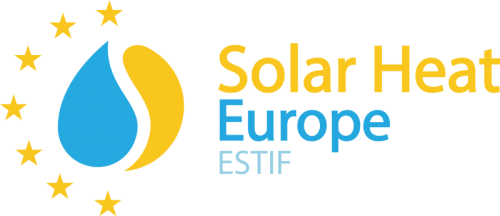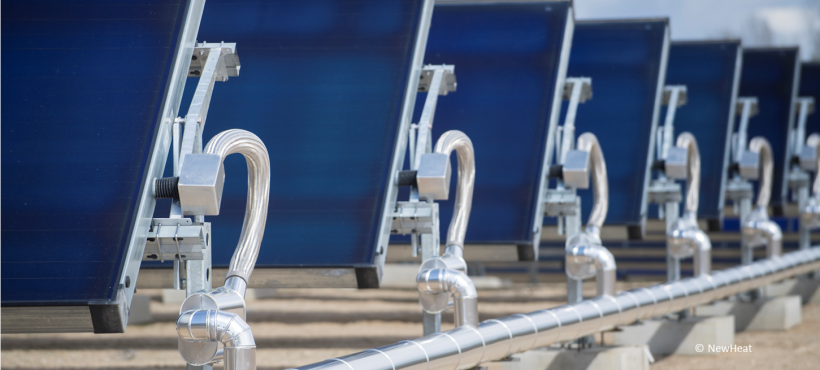The European solar thermal sector has been steadily growing during the past few years and at this stage not even a global pandemic seems to have stopped it. In 2019 the market showed a yearly sales increase of +3,4% and total installed capacity grew by 2,5%, resulting into 26.3 TWhth of estimated generation and more than 20 000 jobs active in the sector and early market data show the largest European market, Germany, growing at 2 digits in 2020.
Along the years, the solar thermal industry has been constantly evolving and developed new applications such as large-scale solar heat plants for districts and industries, and PVT collectors, hybrid products combining both photovoltaics and solar thermal. Solar heat for industrial process (SHIP) systems are becoming a growing reality and could play a key role in industrial decarbonisation if the right instruments are implemented.
Decarbonising the European industrial sector
Industry accounts for more than one third of global energy demand, and 74% of its energy needs comes from process heat. Solar thermal heat can be used in several industrial sector and at different temperatures, reaching through concentrated collectors above 200°C thermal needs. Considering that in Europe almost half of the industrial heat consumption is below 200°C, or used for process cooling, this clearly shows the potential of this technology. Worldwide SHIP installations have been exponentially growing, increasing in Europe from 2MWth to 10MWth in just a couple of years. However, risk mitigation measures are still needed to facilitate and further promote investments in large-scale solar thermal systems.
European businesses are slowly embracing the energy transition, but they still need incentives to investigate options to integrate renewable solutions in their industrial processes. Looking at the industrial sector, companies are reluctant to change mainly for two reasons:
- energy is a minor component in their production process and/or final product cost, and therefore is not worthy to invest time and resources in new renewable solutions such as solar heat;
- energy is a fundamental part of the process and/or final product cost, leading to companies being averse to take risks changing their heat supply.
In this context, industries need to build trust and to be motivated to get out of business-as-usual practices and move forward to new and modern renewable solutions. To achieve decarbonisation European businesses will need a similar approach to the one of nearly-zero energy buildings (nZEB) but with a more gradual process, progressively surpassing their concerns on competitiveness and exploring renewable alternatives locally produced.
The European Context
Europe has pledged to become carbon neutral by 2050 and set the bar higher in terms of its climate and energy ambitions. To achieve this goal solutions such as solar thermal will be needed and targets for renewable heat sources must be strengthened and become mandatory. A balanced system of push and pull measures must be implemented to promptly switch to renewable sources. Therefore, we ask for an obligation of a 5% quota of locally produced renewable heat in EU industrial processes.
The low percentage will not affect critical processes nor the competitiveness of European businesses. Instead, it will push companies to explore sustainable alternatives, often more competitive in the long term, and move away from fossil energy. These obligations should be coupled with financial incentives and advantageous conditions to create a harmonious and smooth framework. New investments on locally generated renewable heat must be supported through structural funds to engage even more European businesses. As mentioned before, some mitigation actions should be implemented to de-risk investments for large-scale solar heat projects. The focus should be on renewable heat since power purchase agreements (PPAs) are already in place to promote renewable power sources. Furthermore, over the last years renewable heat deployed at a slower pace than renewable power.
Europe must implement a conditionality for financing to prioritise locally generated renewable heat as solar thermal when allowing new investments to expand or replace heat/cold generation for industrial use. Only in this way Europe’s fight for climate neutrality will be effective and coherent with its different regulatory and financial tools.
SHIP untapped potential in Southern Europe
When dealing with industry decarbonisation, SHIP has already a consolidated experience in Central and Northern Europe but is still largely unexplored in Southern member states. To further discuss this untapped potential in Greece and southern regions, Solar Heat Europe is organising a side event for the EU Industry Days with the support of other key partners including IRENA, IEA Solar Heating and Cooling programme, AEE Intec and companies specialised in the topic, such as Absolicon, newHeat and Solrico.
The virtual workshop will take place on 9th March 2021, 10-11AM CET, it will present a case study from Greece and discuss new innovative business models (ESCOs). During the event, a representative from IRENA will also present an overview on cost data for commercial solar heat plants in Europe in comparison with other world regions.
About the EU Industry Days
The 4th edition of the EU industry days will take place online from February 23-26 and will focus on three main pillars: shaping Europe’s digital future, making Europe’s industry climate-neutral by 2050, and EU competitiveness in the changing global competitive landscape.


Leave a Reply